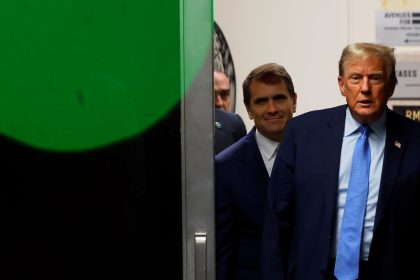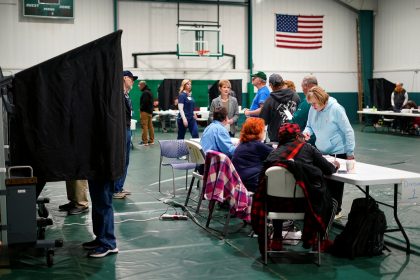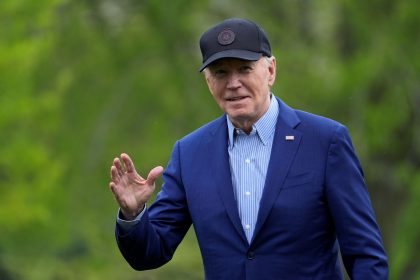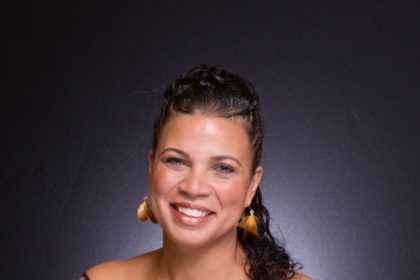Everything You Wanted to Know About the Iowa Caucuses, but Were Afraid to Ask
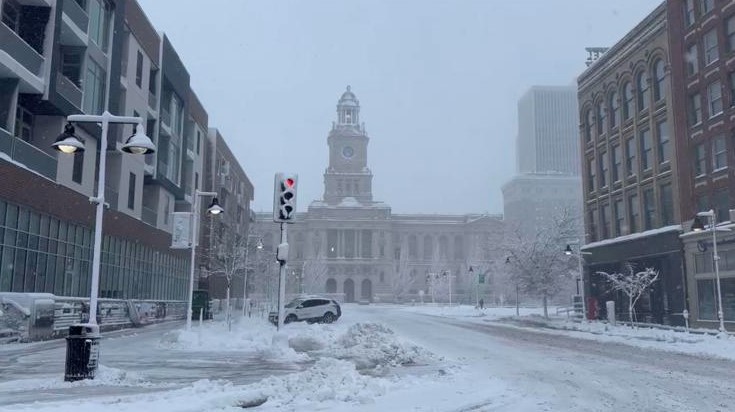
DES MOINES, Iowa — Iowa has a distinctive way of greeting an out-of-state visitor attending the state’s world famous caucuses for the first time.
Snow abounds. And as one steps out of Des Moines International Airport to a waiting car for the five-minute drive to the state capitol, it’s impossible not to be struck by the enormity of the cold.
“The temperature has been hovering around 23 degrees, without the wind chill,” Greg Piklapp had warned days before our arrival.
Piklapp is the director of economic development outreach and government relations at the Chamber of Commerce in Ames, Iowa, located about 20 minutes north of Des Moines. Ames is home to Iowa State University.
He laughed when told we’d be flying in from the relatively balmy East Coast, which at the time was experiencing temperatures in the high 30s.
“That’s a heat wave here in the middle of January,” he said, before adding with an almost audible shrug, “but what’s caucus time in Iowa without a blizzard and howling wind?”
Though the Democratic National Committee has shaken things up this year, knocking both Iowa and New Hampshire from their respective perches as first-in-the-nation contests in America’s quest to choose the new president, the caucuses still have a magical allure for anyone who follows presidential politics.
It hasn’t hurt that while the DNC has deemed its Feb. 3 South Carolina primary its first sanctioned contest, the Republican National Committee has held fast to tradition and has seen a spirited race unfold pitting former President Donald Trump against top challengers former South Carolina Gov. Nikki Haley and Florida Gov. Ron DeSantis.
All three have qualified for CNN’s Jan. 10 Republican presidential primary debate in Iowa, with Trump continuing to hold a commanding lead in the polls despite a plethora of legal challenges.
As a result, many pundits say the mostly closely watched race in Iowa on Jan. 15 will be the one for second. For DeSantis, whose campaign is said to be in turmoil, a strong showing in Iowa is vital to showing he has any kind of path to the GOP nomination at all.
Haley, meanwhile, has been gaining in the polls in the Hawkeye State, but has seen a real surge in New Hampshire, where a strong performance in its primary on Jan. 23, could vault her to the head of the pack ahead of her home state’s Republican primary on Feb. 24.
DeSantis and Haley will both participate in the debate, which is being moderated by CNN anchors Jake Tapper and Dana Bash, while Trump will participate instead in a Fox News town hall.
Three other Republican candidates, former New Jersey Gov. Chris Christie, former Arkansas Gov. Asa Hutchinson, and entrepreneur Vivek Ramaswamy, failed to meet CNN’s qualification requirements for the debate.
This is a particular blow to Ramaswamy, who has campaigned in every county in Iowa, while Christie has almost exclusively focused on New Hampshire and Hutchinson only recently began a last-ditch push, scheduling several Iowa events in the last few days.
If Ramaswamy’s presidential hopes die in Iowa, it won’t be for lack of effort, as he has been reaching out to undecided caucus voters with multiple daily events since shortly after Christmas.
Which brings us back to caucus format, a marathon of retail politicking that remains unique in presidential politics.
Iowans, apparently, can’t get enough of it.
“For some reason, you have to come here to be president,” a yard sign not far from the airport read.
And one was hard pressed to come across an Iowan who didn’t believe it.
How Did the Iowa Caucuses Become THE Iowa Caucuses?
With the exception of a one-time experiment with a primary election in the early 20th century, Iowans have been voting through a caucus since the 1840s, gathering in homes, schools and other public buildings to declare their support for their chosen candidates.
For most of their existence, however, these contests were largely overlooked. They typically fell somewhere in the middle of the campaign season, the contest didn’t have a blockbuster number of delegates at stake and in reality party bosses, as in other communities across the country, had an iron grip on the process.
The impetus to change all that began to coalesce in the aftermath of the 1964 Democratic National Convention.
“It was the first modern convention to really show that there were cracks in the system,” said Karen Kedrowski, professor of political science at Iowa State University.
What happened was, as delegates converged on the convention site, Boardwalk Hall in Atlantic City, New Jersey, in August 1964, two delegations from Mississippi showed up. One all White, chosen during an all-White primary in the state, and the other all Black and comprised of members of the Mississippi Freedom Democratic Party.
The MFDP members claimed the seats for Mississippi’s delegates on the grounds that the “official” delegation had been elected in violation of the party’s rules because Blacks had been systematically excluded from voting in the primaries and participating in the precinct and county caucuses and the state convention.
The proceedings of the convention credentials committee were televised and the testimony the nation heard, particularly from MFDP Vice-Chair Fannie Lou Hamer, caused a sensation.
Some Democratic leaders supported an even division of the seats between the two delegations, but the party’s nominee, President Lyndon Johnson, worried such a move would do irrevocable harm to the party in the South.
Eventually, a ham-fisted compromise was worked out: Two of the 68 MFDP delegates, chosen by Johnson, would be made at-large delegates and the remainder would be non-voting guests of the convention.
In return, the regular Mississippi delegation was required to pledge to support the party ticket of Johnson and Sen. Hubert Humphrey, D-Minn., and no future Democratic convention would accept a delegation chosen by discriminatory means.
Most of the White Mississippi delegation walked out of the convention, followed, in solidarity, by almost all delegates representing Alabama.
“They tried to split the difference, but no one was happy,” Kedrowski said.
Then came the infamous 1968 Democratic nominating convention in Chicago.
“A complete debacle,” Iowa State’s Kedrowski said.
“People were sitting at home watching riots in the streets and police crackdowns, the arrest of the Chicago Seven, and of course, there was significant unrest inside the convention itself,” she said.
“Supporters of Sen. Eugene McCarthy, D-Minn., were upset that Hubert Humphrey had locked up the nomination even though he did not enter the race until April of that year and had not won a single primary — he lost those he did enter and missed others entirely because he entered the race so late in the election cycle.
“And this left a lot of people feeling that there had to be a better way, and that having voters decide the candidates, as opposed to the party bosses, really would be the more democratic way to do things, with greater openness and opportunities for participation by rank-and-file Democrats.”
In the wake of the tumult at the 1968 convention, the Democratic National Committee formed the Commission on Party Structure and Delegate Selection.
Later known as the McGovern-Fraser Commission, because it was led first by Sen. George McGovern, D-S.D., and later Rep. Donald Fraser, D-Minn., the 28-member body significantly changed the rules of the game, and, among other things, barred party leaders from choosing delegates in secret.
McGovern resigned from the commission in 1971 in order to run for president and was the first candidate to win the nomination under the new rules. However, he ultimately lost the general election to incumbent Republican Richard Nixon in 1972.
“The main thing the McGovern-Fraser Commission did was open up the delegate selection process to more people, not just the party activists,” Kedrowski said.
“As a result, a lot of states switched over to primaries, but the commission also created rules for caucuses, which in many places were the traditional way of choosing delegates,” she said.
For one thing, caucuses now had to be open to all registered voters within the party, and public notices had to be published, stating the date, time and location of the caucus meetings.
“There also had to be wide publication of the rules in advance, like how someone could influence the platform and things like that,” Kedrowski said.
In addition, the reforms dictated that the caucuses be held early. District conventions were held separately from the state convention, adding another step to the process.
And the party assured that what happened at the grassroots level, from delegate selection to the party platform, made it to the next level: that is, from precinct caucuses to county, district and state conventions.
That meant time was needed for meetings and sending masses of printed material to thousands of people who were now involved in the process.
“Of course, the very need to create these rules is an indication that once upon a time, these things didn’t happen, right?” Kedrowski said. “The party bosses at the county level would get together in somebody’s house and drink whiskey and smoke cigars and talk about who they wanted to run the show.”
In Iowa’s case, what these post-1968 reforms meant was the state parties and their local affiliates were sent scrambling to gather the rudiments of a new election infrastructure.
“Among other things, they now had to go out and rent a small office, get a mimeograph machine and maybe even hire a few staffers … and they also figured out very quickly how to use something called the U.S. Postal Service to distribute their materials,” Kedrowski continued.
“Then they had to sit down and say, ‘Okay, we have to have our delegates picked for the national convention by such and such a date, and before that we have to have congressional district convention, county conventions and precinct caucuses … and we need time to collect the information from those, organize it and send the information up to the next level of people running the next event.
“By the time they got done with all these calculations, and giving themselves a reasonable amount of time to complete these tasks, they had leapfrogged to the beginning of the process,” she said.
“Was this done out of any sort of great political acumen or desire or vision for making Iowa particularly relevant? No,” Kedrowski said. “It was done, simply out of necessity. And the thing is, in 1972, nobody in Iowa was even aware that when they set their calendar of events, that their little meetings in January were going to be the first contest in the nation. It really kind of flew under the radar screen.”
The Transformative Vision of Jimmy Carter
The McGovern-Fraser reforms also brought with them another kind of change. Whereas in the past, Iowa was a winner-take-all contest, the new rules inspired it to opt for proportional distribution of delegates based on candidate performance.
Though the real ramifications of that change did not manifest themselves in 1972, it opened the door to the press considering the Iowa caucuses a new kind of horse race and no one would benefit from that more than a former governor and peanut farmer from Georgia who had no national profile when he decided to run for the nation’s highest office in 1976.
By then, it must be said, the Iowa caucuses were already creating something of a buzz. In 1976, the nation’s bicentennial, both political parties, for the first time ever, decided to hold their caucuses on the same night.
What’s more, the GOP decided to precede its formal caucuses with a series of more informal “straw polls” that gave an early indication of a candidates’ relative popularity with voters while also serving as a major fundraiser for the state party.
Still it was the Democratic contest that garnered the most attention in 1976 and Carter was at the center of it.
Carter announced his candidacy in December 1974 and campaigned relentlessly, visiting 40 states and 250 cities over the following year.
Still, the governor was considered, at best, a long shot. Even The Atlanta Constitution, his hometown newspaper, was skeptical. On the day after he announced his decision to run, it famously ran the story below the headline, “Jimmy Who?”
But Carter instinctively knew better than the prognosticators. He knew he’d be helped significantly by post-Watergate campaign-finance reforms, namely one that enabled any candidate to qualify for public financing as long as they raised at least $5,000 from private donors in a minimum of 20 states.
And from the very start of his campaign, Carter believed a victory in Iowa would change the dismissive narrative around his chances of winning and make it easier for voters to support him in later voting states like New Hampshire.
Together, Carter and his campaign aide, Tim Kraft, organized 20 in-state committees whose job it was to find volunteers for the caucuses. They would be expected to talk up Carter’s candidacy and woo their neighbors to the former governor’s cause.
Meanwhile, Carter himself was indefatigable, campaigning relentlessly in the state while other candidates in the crowded field largely ignored it.
Carter would walk door-to-door and leave personalized notes stuck in the doors where nobody answered. When he did get to talk to somebody, he had his staff follow up with personalized thank you letters.
Rosalynn Carter also played a significant role, driving on ahead of her husband to tell local television and radio stations that he would be following soon and was available for interviews.
Carter’s other masterstroke was understanding appearances could mean everything.
On the night of Iowa’s 1975 Jefferson Jackson Day dinner, an annual December fundraiser that traditionally launched the state’s election year cycle, the governor’s team arranged to secure his supporter’s “spectator” seats in the balcony — at a bargain cost of just $2 a ticket — and then Rosalynn Carter and volunteers handed out campaign pins for all to wear.
As a result, every time the television cameras covering the event panned the balcony, it appeared Carter had enormous support from the party’s rank and file and his poll numbers surged accordingly.
On caucus night, Jan. 19, 1976, Carter defeated Sen. Birch Bayh, of Indiana, by a two-to-one margin, garnering 27.6% of the vote to Bayh’s 13.2%.
The remaining candidates didn’t come close, with Sen. Fred Harris, of Oklahoma coming in at 9.9%, Rep. Mo Udall, of Arizona, with 6%, Kennedy family member Sargent Shriver at 3.3%, and Sen. Henry “Scoop” Jackson, of Washington, netting a fraction over 0.0%.
Election trivia buffs will note Carter actually lost to “uncommitted,” which received 37.2% of the vote, but as clear winner of the “name” candidates, the one-time largely unknown Southern governor was on his way to the White House and the dye was cast in terms of what the caucuses could mean to those aspiring to be president.
“Carter was really brilliant when it came to understanding that local political events in a state where they mattered could jumpstart a national campaign,” Kedrowski said.
“One of my colleagues, who just recently retired, loves to tell the story of how he was working in his yard one day, in the summer of 1975, when this little entourage on bicycles came up his driveway,” she said.
“One of the cyclists got off his bike and extended his hand as he approached my colleague and said, ‘Hi, I’m Jimmy Carter and I’m running for president.’ And it’s just a wonderful, sort of typical Iowa story.”
To give his victory even more zing, Carter flew to New York City in the middle of the night after the caucuses, so that he could be available for the networks the next day.
And he scored a trifecta, appearing on ABC, CBS and NBC to talk about his victory. By the time he was through, he was the candidate to beat. By the end of 1976, Time magazine had named him its Man of the Year.
“Jimmy Carter came to Iowa, a state with not much at stake in terms of delegates, campaigned really hard, and it catapulted both him, and Iowa, into the national spotlight,” Kedrowski said.
How The Iowa Caucuses Work
Even today, most Americans who don’t live in a caucus state are in the dark as to how they work and how they are different from a primary.
While a primary functions just like an ordinary election with voters casting their ballot at a polling site or by mail, a caucus requires voters to gather at a specific time and place — it could be a school, community center, church or any other public civic space — and discuss their preferences in public among their neighbors.
In years past, Democrats would gather at their caucus location and sort themselves physically, according to the candidate they supported. Then, after a count, any candidate that fell below the threshold of viability would be eliminated and their supporters would be invited to realign themselves with a viable candidate.
This year, with the Democratic National Committee’s decision to vault the South Carolina primary to the head of the pack, things will be markedly different.
The DNC made the change, at President Biden’s urging, to prioritize states it says are more racially diverse than Iowa and New Hampshire, which have largely White populations.
After South Carolina Democrats vote on Feb. 3, Nevada will follow on Feb 6. New Hampshire was also to have voted on Feb. 6 under the DNC’s revised schedule, but opted to schedule an unsanctioned primary instead, on Jan. 23.
As Madalyn Anderson, chairperson of the Story County Democrats of Iowa explained in an email to The Well News, the presidential preference portion of the Democratic Caucuses will be done by mail, with results to be announced on Super Tuesday, March 5.
The first ballots, called “preference cards,” will be mailed out on Jan. 12, and voters can request one until Feb. 19.
“The in-person portion, to elect delegates and conduct other party business will be held on Jan. 15, in our case, at the Ames High School gymnasium. All Story County precincts will meet there,” she said.
Republicans, meanwhile, are sticking with their longstanding primary calendar and will hold a far more traditional affair for their side, with local supporters of specific candidates making speeches in order to entice others to endorse their preferred choice.
The caucus attendees will then take a vote and candidate delegates will be nominated to attend their respective county conventions.
2024 Race in Iowa Marked By Intense Advertising, Little Student Interest
Mack Shelley II, another professor of political science at Iowa State University, said this year’s race to caucus night has seen an “intense” amount of advertising, but he suspects “all the sound and fury … almost all of it on the Republican side … probably signifies very little.”
“That’s because a Trump win seems all but inevitable and Haley and DeSantis are beating up each other for the honor of running a very distant second,” he said. “Iowa’s role since the inception of the modern caucus system in the early 1970s has been to winnow out candidates, which it will do again this cycle when the distant also-rans get out of the way of the Trump juggernaut.”
“Now, for what it may be worth, the perceived wisdom is that Iowa punches three tickets out of the state for candidates running a competitive caucus,” Shelley continued. “Biden has been totally absent from the state, and clearly the national Democrats long ago gave up on any pretense that Iowa will be competitively ‘purple.’ It is deep Republican red and rapidly running backward in history and into irrelevance.”
Iowa’s turn away from being competitively purple could also be contributing to the palpable sense of apathy that has gripped many of the state’s college campuses.
According to Shelley, “the amount of campus-based interest in the campaign is barely above zero, apart from the respective campaign organizations.
“When candidates have visited [our campus here in Ames] they don’t seem to have prioritized students as prospective voters, which may be logical considering that youth voter turnout typically is rather minimal.
“Barack Obama and even more so, Bernie Sanders, were great for ginning up student turnout at caucuses, but younger members of the electorate aren’t likely to be very excited about geriatric candidates this time around,” he said.
“Basically, Iowa is becoming less and less relevant, due to its small size, lack of competitiveness and having its collective head pretty much stuck somewhere between the 1850s and 1970s,” Shelley said.
“I point out to students that from 1880-1930 Iowa had 11 members in the U.S. House, and now has 4, demonstrating that it now is a state that includes about 0.9% of the nation’s population and increasingly is becoming a political backwater run by intensely reactionary interests representing religious culture war fanaticism and corporate greed,” he continued, adding, “Not exactly a place that lots of young people with new ideas are going to want to come to.”
Will Changing the Order of Their Nominating Contests Come Back to Bite the Democrats?
Given the intensity of his feelings, it wasn’t surprising to learn that Shelley believes the DNC’s decision to reorder its caucuses and primary contests could ultimately hurt the party.
“The Democratic Party in Iowa already is pretty much in shambles at this point, with zero congressional representation and very deeply in the minority in the state legislature with only one statewide official (Auditor Rob Sand, who won by a whisker in 2022), so further deprecating the party’s status within the state makes it all the more solidly Republican,” Shelley said.
“More broadly, the DNC and Biden administration’s outreach to more diverse electorates in South Carolina and Nevada may produce some benefits with African American and Hispanic/Latin demographics but comes at a time when the previously strong Democratic hold on those voting groups has atrophied considerably,” he continued.
“In addition, the party’s advantage among younger voters is seriously endangered by policies regarding Gaza/Israel, immigration and continued fixation on raising huge amounts of campaign cash from … within the party’s establishment.”
Shelley dismissed the current DNC as “essentially a fundraising machine” whose purpose is “to pay off the camp followers who largely control the campaigning process and who insist on running campaigns pretty much the same way it’s been done for the last fifty years or so.
“The point is that the party ‘leadership’ isn’t so much in charge as it is locked into a rut that leads to flailing around rather than moving forward,” he said. “Reshuffling the primary schedule (and effectively destroying the caucus process on the Democratic side) may pay off, and does constitute something of a new idea, but seems to ignore the institutional rot that besets the party.”
How Will South Carolinians Respond to Their New Role
As fate would have it, though Kedrowski is a native Midwesterner, she actually taught for more than 20 years at Winthrop University in Rock Hill, South Carolina, before returning to the Midwest ahead of the 2020 Iowa caucuses.
“I experienced six presidential election cycles in South Carolina and did a lot of interviews with political eggheads during that time, so I’d say South Carolina is well acquainted with the media attention that comes with being an early primary state,” she said.
“What I do think is markedly different is the voters … there’s a sense of political efficacy in Iowa that just does not exist in South Carolina,” she continued. “People turn out and vote, but you don’t get these real intense conversations about who you are supporting like you do in Iowa — not even amongst my political friends.
“In Iowa, people will go and hear multiple candidates and sign up on multiple mailing lists, and when they go to events they ask really complicated and sophisticated questions,” she added.
In fact, Kedrowski said she was literally “gobsmacked” when she went to her first campaign events in Iowa four years ago and heard the nature of the questions being asked.
“I mean, people were asking for details on Medicare for all, on the farm bill, and where people stood on green technologies and renewable energy — and it was way beyond the buzzwords. Iowans really want to get into the nitty gritty of policy.”
Another trait that Kedrowski believes separates Iowa and South Carolina voters is that Iowans are “very comfortable talking about who they want to support and trying to convince other people to do the same. Iowans take all this very seriously and to another level compared to people in other states.
“So those who show up at the caucuses in Iowa, they really believe that they are performing a service for the nation by scrutinizing these candidates very closely and they know they have this up close and personal set of opportunities that most people in the nation don’t have.
“I’m not in any way putting South Carolina voters down, they’re just different,” Kedrowski said. “In Iowa, caucus attendees see it as their duty, their patriotic duty, to try and make some good choices.”
Dan McCue, editor of The Well News, will be reporting from Iowa throughout the caucuses. He can be reached via email at [email protected].


















